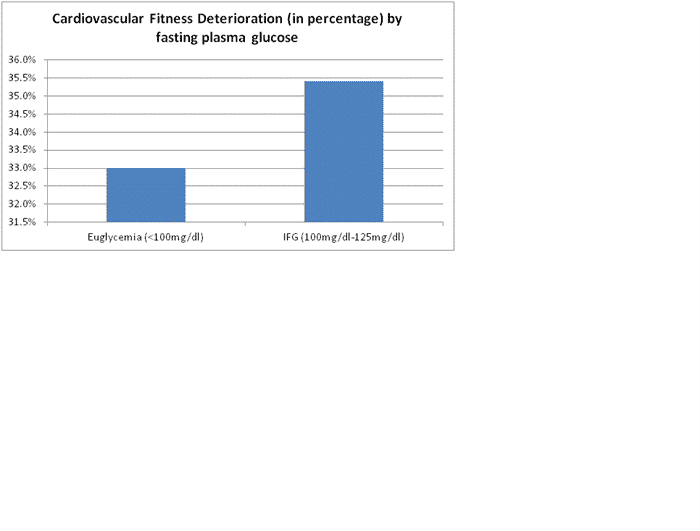Background: Cardiovascular fitness is associated with cardiovascular morbidity and mortality and hence a major target of health interventional programs. However, data on factors affecting cardiovascular fitness are limited. The objective of the current analysis was to evaluate the association between fasting glucose and fitness deterioration. We investigated 14536 men and women who were annually screened at the Institute for Medical Screening of the Chaim Sheba Medical Center. All subjects were free of diabetes mellitus, had their fasting glucose documented and completed at least two maximal exercise stress test (EST) according to the Bruce protocol. Subjects were divided at baseline into two groups: euglycemia (<100 mg/dl) and impaired fasting glucose (100-125 mg/dl). Change in cardiovascular fitness was determined by comparing the treadmill time duration between two consecutive EST. The primary endpoint of the current analysis was cardiovascular fitness.
Methods: deterioration, defined as ≥ 3rd tertile percent reduction in treadmill time at the second test.
Results: Mean age of study patients was 48 ± 10 years and 74% were men. A total of 4845 (33%) deteriorated in cardiovascular fitness. Deteriortaion of cardiovascular fitness was more common among subjects with impaired fasting glucose versus subjects with euglycemia (Figure 1). Multivariate binary logistic regression model showed that an older age, female gender, higher body mass index, hypertension and low HDL levels were all associated with cardiovascular fitness detrioration. After adjustment for these factors, subjects with impaired fasting glucose were shown to be 14% more likely to have cardiovascular fitness deterioration compared with euglycemic subjects (95% CI OR[1.02-1.27] p=0.02).Our findings suggest that impaired fasting glucose levels are independently associated with increased likelihood for deterioration in cardiovascular fitness in appraently healthy middled-aged adults.
Conclusions:
 :
:

